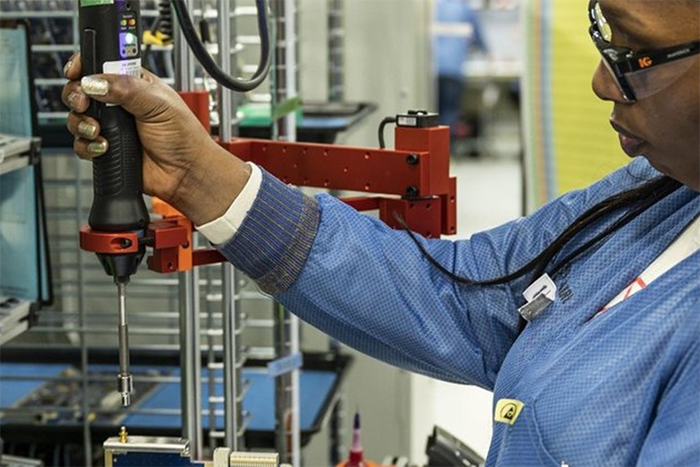RIT Certified wants to unify skilled workforce with employers in need
An L3Harris employee at the company’s Jefferson Road Operations Center in Rochester uses a programmable torque driver as part of a radio manufacturing process. L3Harris and RIT Certified will work collaboratively to develop an advanced manufacturing curriculum to provide access to a wider population of upstate New York. (Photo provided)
DENNIS DI LORENZO believes there is a need to build a workforce bridge between learners and in-demand skills, and between employers and qualified, well-matched talent.
Di Lorenzo — executive director of RIT Certified — also believes his organization can help build it.
“Workforce development is like raising a child; it takes a village,” Di Lorenzo said.
Since its inception roughly 18 months ago, RIT Certified has worked with local partners to create workforce development and professional training programs, as well as certificates and skills-based programs, that meet the workforce needs of the local community.
Its approach is gaining traction, as well as financial support.
The unit within RIT recently secured nearly $1.6 million from three funding sources to support its efforts.
That includes $999,000 from the New York State Office of Strategic Workforce Development to develop training for six programs geared toward occupations such as manufacturing technicians, information technology support analysts, cyber-defense analysts, skilled tradespeople, health care careers and building construction managers.
The initiative also includes a training program to prepare employers supporting new workers from historically marginalized communities, as well as partnerships with organizations and regional community partners including L3 Harris Technologies, the Rochester-Monroe Anti-Poverty Initiative, RochesterWorks and the Rochester Technology and Manufacturing Association.
Additionally, the Ralph C. Wilson Junior Foundation and the ESL Charitable Foundation will donate $300,000 each to RIT Certified to support research and skill building and assessment frameworks for the training programs.
The funding supports RIT Certified’s initiative: Promoting Choice: Alternative Pathways into Work and Economic Mobility, which was designed to deliver employer-driven, competency-based workforce training and wraparound support with community and industry partners that aims to reduce barriers to participation and work for historically marginalized communities in the Greater Rochester region.
RIT Certified’s project is a direct implementation of the recommendations made in the Finger Lakes Regional Economic Development Council’s 2020 strategic plan.
Di Lorenzo — who previously worked as a higher education consultant and dean at New York University’s School of Professional Studies — said the need for skilled workers locally mirrors what is happening across the United States, and even across the globe, especially over the last several years.
Part of the reason is because employee skills are not keeping pace with employers’ needs.
RIT can play a unique role in helping address the problem, he said, given the university’s expertise in integrating the arts, technology and engineering.
RIT Certified recently launched its first set of programs, including one that focuses initially on information technology and expands into the cybersecurity arena.
By the end of the year, additional programs will be added including a manufacturing technician program, construction management and semiconductor fabrication for work-ng engineers, Di Lorenzo said, adding that additional offerings will be added after that.
The courses were designed with flexibility and affordability in mind. Courses range in prices from $500 to $1,500, with full programs costing between $2,000 and $5,000.
Courses run for as little as 10 weeks, but no longer than a year. In addition to offering program areas that provide a starting point to help people gain work, the organization is also working with employers to ensure progression through upskilling to promote job mobility, Di Lorenzo said.
Renee Swan, vice president of human resources at L3Harris, agreed there is a need for skilled workers.
The company is introducing advanced manufacturing equipment to drive quality improvements and to reduce production times and employee fatigue.
Through its collaboration, L3Harris and RIT Certified will work collaboratively to develop an advanced manufacturing curriculum to provide access to a wider population of upstate New York.
“Innovations within high-technology operations today are evolving at lightning speed, and the need for skilled advanced manufacturing technicians has never been higher,” Swan said.
She noted that the partnership provides a new way for interested individuals to join a fulfilling career field with advancement opportunities.
“It also assures our customers a full pipeline of skilled professionals dedicated to delivering some of the most advanced capabilities on the planet with the world-class quality they expect and need,” Swan added.
The RTMA will serve as a connector between RIT Certified and the technology and manufacturing employers in the region to provide apprenticeship opportunities, among other roles, throughout the Finger Lakes region.
Robert Coyne, RTMA’s executive director, said the partnership with RIT Certified in advancing manufacturing careers will have a positive impact on the community.
“The economic engine that advanced manufacturing provides will be expanded through RIT Certified and RTMA’s outreach to underserved populations and those that may not have been exposed to these great careers,” Coyne said.
To learn more, go to the original article available in the Rochester Business Journal.

